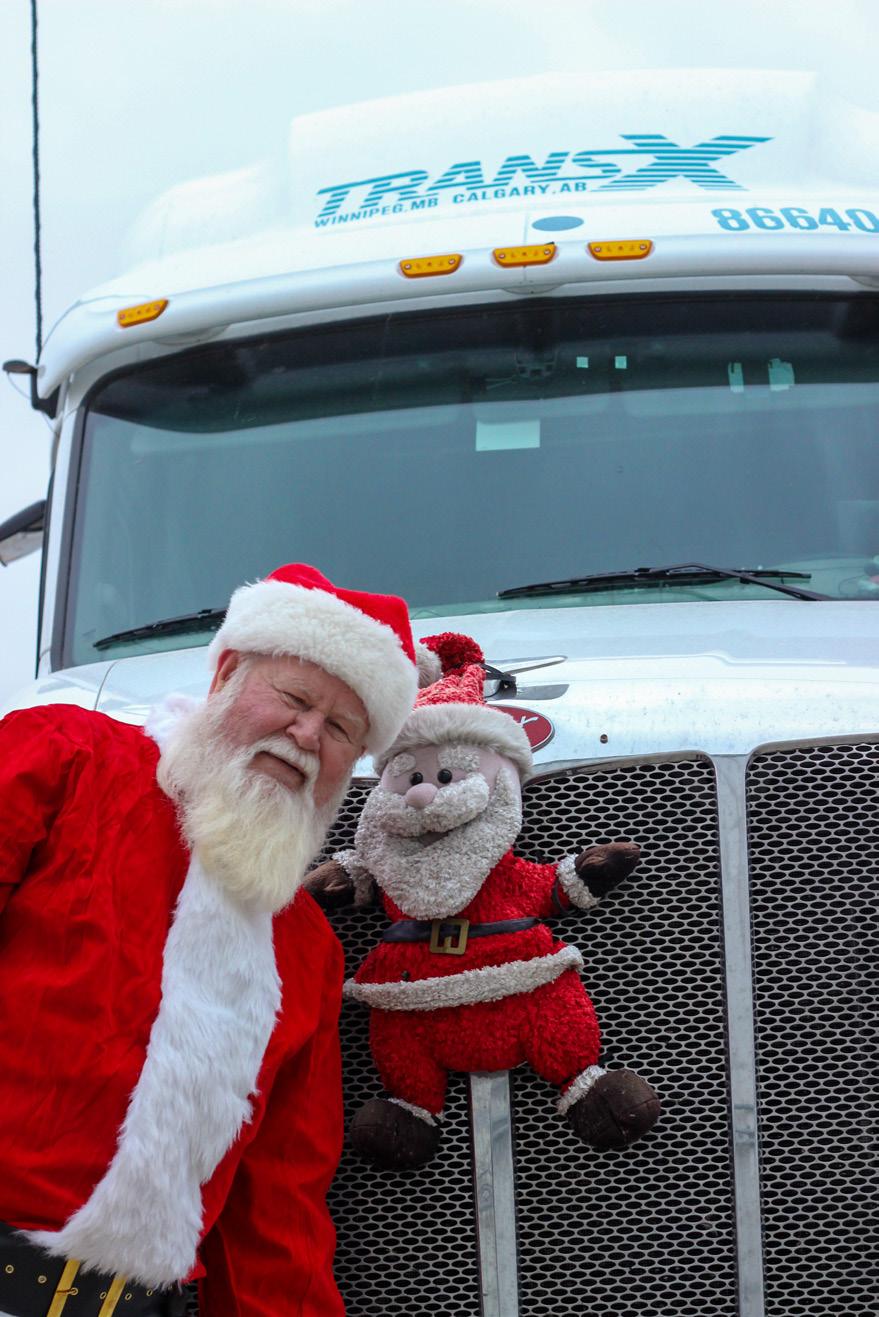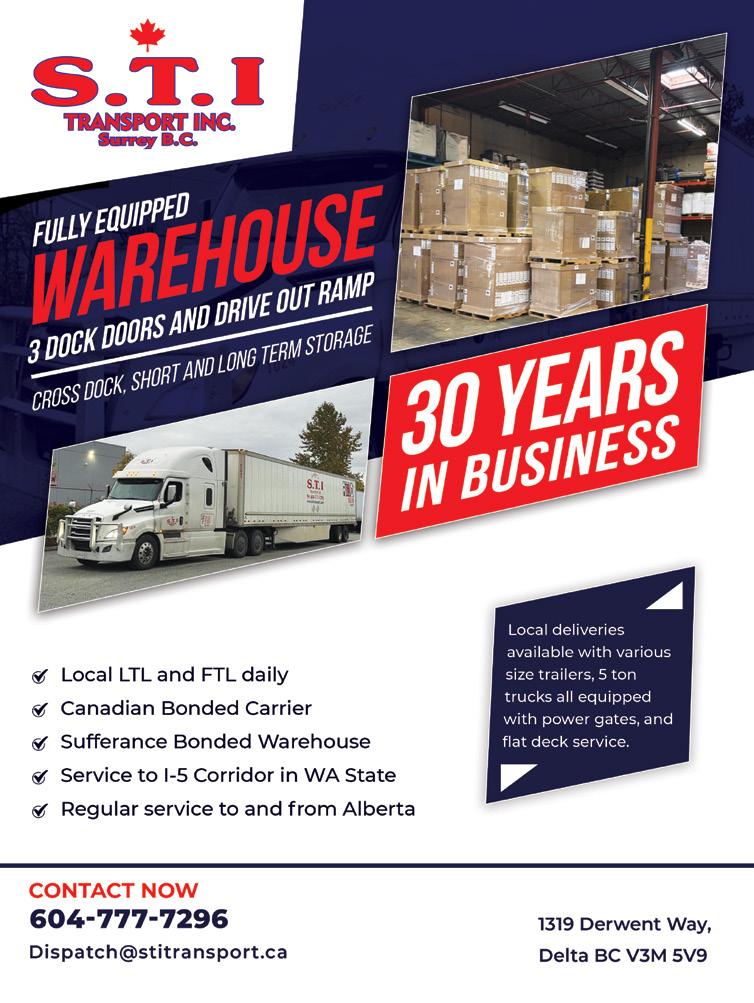
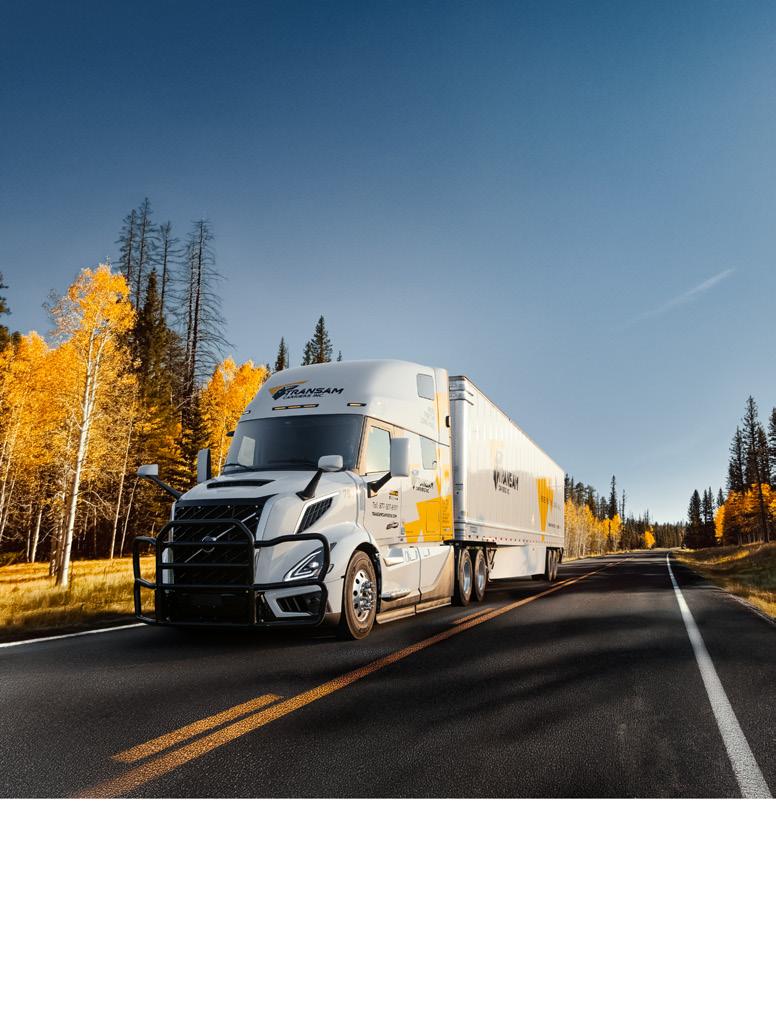















Are you an Experienced freight broker ready to grow with one of North America’s most trusted transportation brands?
At Challenger Motor Freight, part of the Fastfrate Group, we offer independent freight agents the support, reputation, and resources of an industry leader, while giving you the freedom to build your business, your way
✔ Access to a full-service North American transportation network
✔ Back-office support
✔ Competitive commission structure
✔ Challenger brand to boost your presence
✔ Asset Based Integrated Solutions: TL, LTL, Intermodal, Warehousing, Final Mile











Our dedicated transportation division ensures each client’s portfolio encompasses tailor-made coverages; from private auto, cargo and pollution to D&O, bonding and warehousing. Our unique relationships with major transportation insurers, allows us to negotiate enhanced coverages at the most competitive rates available. Our in-house claims manager follows every claim along to a successful conclusion and is available 24 hours a day, 7 days a week.
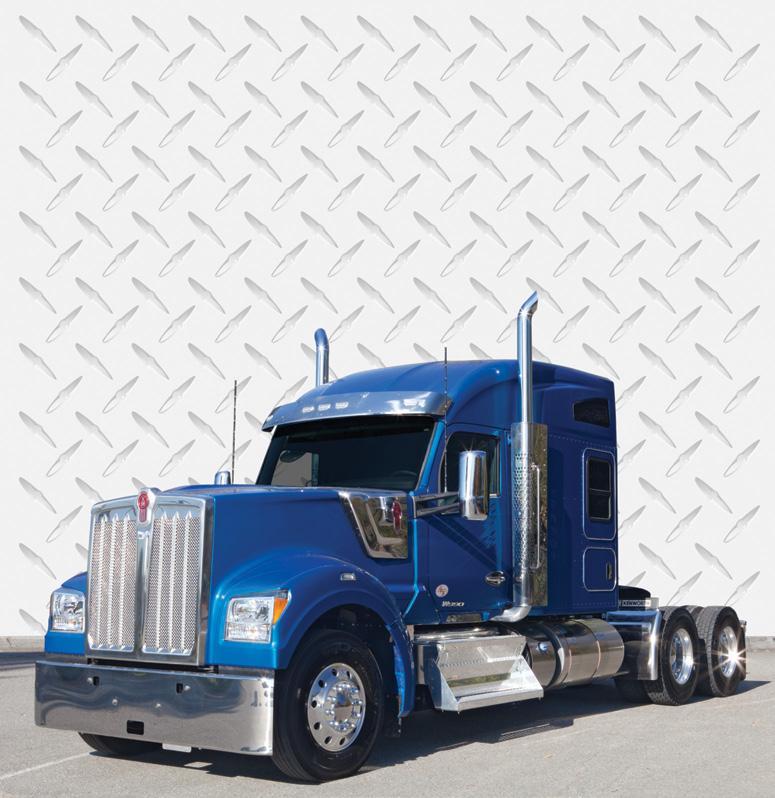
If you have any questions concerning a competitive quote on your transportation insurance, or would like to set up a fleet or prorate account, please contact our Commercial Division and speak with one of our transportation specialists.


BY JOHN WHITE
The Convoy, the Courtroom, and the Road Ahead
The recent sentencing of the Truckers Convoy organizers has stirred old emotions and reopened old wounds. Whatever your opinion of the convoy, there’s no denying it was a symptom of something much bigger than a protest about mandates. It was a message from a working class that felt ignored, dismissed, and pushed too far.
Truckers didn’t wake up one morning and decide to roll across the country for the fun of it. They’d been living with uncertainty, government overreach, and policies written by people who’ve never spent a night in a sleeper cab or waited six hours at a border crossing. For many, the convoy was less about vaccines and more about respect.
Those who joined or supported it were hard-working Canadians tired of being told what to do by people who don’t understand their lives. And while the courtroom drama plays out, the real frustrations on the road continue. Truckers face rising fuel costs, low pay, inconsistent training standards, excessive paperwork, and a chronic shortage of safe rest areas. But one of the biggest irritations is that every province makes up its own rules. Instead of one clear set of national standards, we’ve got ten transportation ministers pulling in ten different directions. What’s legal in one province can get you fined in the next. Whether it’s MELT training, weights and dimensions, or safety enforcement, drivers must navigate a patchwork system that makes “coast-to-coast” trucking more complicated than crossing into the U.S.
The convoy may be in the past, but the frustration that fueled it is not. If Ottawa truly wants to move forward, it should start by listening — really listening — to the people behind the wheel.
On a brighter note, the industry took time to celebrate one of its best. Huge congratulations to Ken Moss of Reflection Truck Body Repair, recipient of the Lifetime Achievement Award at the Metro Vancouver Transportation Night 2025.
For more than five decades, Ken has been respected for his craftsmanship, integrity, and mentorship. He spent his teenage years rebuilding old cars, began his Body and Collision Repair apprenticeship after high school, and by the mid-’80s had become Body Shop Manager at Freightliner. Over the years, he built a reputation for quality and trust that few could match.
In 2000, Ken joined Reflections Paint & Body, helping grow the shop into one of the most respected in the province. Later, he realized his dream of building his own modern facility in Chilliwack. Now semi-retired, he still spends a day or two a week in the shop, passing on his knowledge to young technicians and staying connected with loyal customers.
Ken Moss’s career is a reminder of what keeps this industry rolling: pride, skill, and respect — the very values that built Canada’s trucking community in the first place. More about the 3rd Annual Metro Vancouver Transportation Night on page 22

EDITOR-IN-CHIEF
John White: john@ptmag.ca
PUBLISHER
Coast2Coast Business Pages Ltd.
ADVERTISING/MARKETING
Tony Arora: tony@coast2coastpages.com
John White: john@ptmag.ca
CONTRIBUTING WRITERS
• Colin Black • Greg Evasiuk
• Scott Casey • Dave Madill
• Glen Millard • Myrna Chartrand
• Andy Roberts
PHOTOGRAPHY
Ben Proudley • Alicia Cornish David Benjatschek wowtrucks.com
COAST2COAST BUSINESS PAGES LTD.
HEAD OFFICE #235 - 8138 128th St. Surrey BC V3W1R1 P: 604-724-8976 | F: 604-598-9264
tony@coast2coastpages.com I www.driverschoice.ca
The contents of this publication may not be reproduced by any means, in whole or in part, without prior written consent of the publisher. The advertiser agrees to protect the publisher against legal action based upon libelous or inaccurate statements; the unauthorized use of materials or photographs; and/or any other errors or omissions in connection with advertisements placed in the Magazine. The publisher can and will refuse any advertising which in his opinion is misleading or in poor taste. The publisher does not endorse or make claim or guarantee the validity or accuracy of any advertisement herein contained. All materials submitted for publication are subject to editing at the publisher’s discretion. The act of mailing or e-mailing material shall be considered an expressed warranty by the contributor that the material is original and in no way an infringement on the rights of others.
Publications Mail Agreement #42378023. Return Undeliverable Canadian Address to: #235 - 8138 128th St. Surrey BC V3W1R1.

Pictures by: David Benjakschek www.wowtrucks.com
Our November/December Rig of the Month driver is Corey Wiersma, a 3rdgeneration propane hauler from Lacombe, Alberta. This is his story.
I’ll probably sound like one of those young guys who swears he’s been driving in reverse longer than most folks have been going forward — or that I’ve seen the worst roads with my eyes closed. Truth is, it just feels like I’ve been driving that long. I’ve only had my Class 1 for about sixteen years, but that’s been long enough to collect more memories, friends, and lessons than I ever thought possible. From early-morning coffees at dusty card-lock stations to late-night beers in small-town bars, I’ve met some of the best people you’ll ever find.
I was born and raised around Red Deer, Alberta. My whole family seemed to live and breathe trucking — uncles, aunts, grandpas, and of course, my dad, Darrell. He’s the one who helped me get my Class 1. He taught me everything I know — but, as he likes to remind me, not everything he knows. That also makes me a third-generation propane hauler.
Once I got my license, Dad bought a second truck for his little company so I could start hauling propane Super B’s. Yep, at the young age of
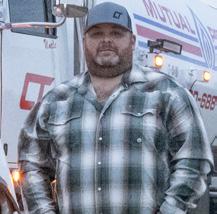
Wiersma
eighteen I was running southern B.C. with a load of propane. No harm, no foul. A few weeks later, my grandpa Orin decided he wanted to go for a ride with me. It was a short trip, but it’s one I’ll never forget — even though I’m pretty sure he wasn’t too impressed with how fast I was going. I remember glancing over and seeing him gripping the dash tighter than a vise, but he never said a word. That quiet pride meant everything to me.
A few years later, I decided it was time to try owning my own truck. D
& B Wiersma Trucking helped me out by selling me one of theirs so I could get started. I was twenty-two, proud as hell, rolling in a single-axle propane body-job truck contracted to Mutual Propane out of Edmonton. I’ve been hauling for them ever since.
Over the years, I upgraded from that little single to a tandem, and in 2020, I bought a brand-new Western Star 4700. Like most new rigs, I hated it at first. Everything beeped, buzzed, or told me what to do. But now I love the stupid thing. She’s been good to me. And if you’ve seen Super Troopers, you’ll get a laugh out of this — my unit number is 91.
I’ve thought about growing the business — adding a couple of trucks and maybe hiring a driver or two — but for now it’s just me and my Western Star. I also put my pickup to work. Got a pilot-truck sign on it now so I can show all the “wide boys” where to go and how to get there. On slower weeks I do a few hot-shot runs just to keep busy. Propane work is mostly winter, so during summer I sometimes help out a good buddy of mine in Innisfail who runs his own small fleet. My dad works there too, and when we end up on the same job it makes for some good laughs and a few stories I probably shouldn’t repeat in print.
Then there’s Hector — my righthand man and four-legged co-pilot. I got him from a friend about eight years ago, and he’s been with me ever since. Hector’s a rock dog. Some folks don’t believe me until they see it, but this dog will bring you back the exact same rock, even if you throw it into a wheat field, tall grass, or straight into a lake. He’ll dunk his whole head under water for an uncomfortably long time just to fetch it.
He rides with me everywhere. If he’s not in the truck, I feel like I’m missing part of myself. And when I
get home after leaving him behind for a day, he lets me hear about it.
He’s also one hell of a backup spotter. One time, I was on an oilfield site with a bunch of white hats walking around. I let Hector out for a stretch while I moved the truck a few yards to the next tank. As I started backing up, the site consultant came running at me waving his arms, madder than a wet hen, yelling that I needed a spotter and that I’d never be allowed back on site.
So I climbed down, pointed to the back of the truck, and there sat Hector — twenty feet behind the trailer, eyes locked on my mirror, doing the job perfectly. The poor guy tripped over his words for a full minute. I just laughed and gave Hector a big ol’ bull stick that night. He earned it.
It’s always been my dream to restore an old Freightliner cabover — the classic square-nose kind — and use it to haul my toy hauler or help some farmer move something sketchy down a gravel road.
One day Dad found a 1984 Freightliner cabover for sale near Calgary. He said, “That’s the truck your grandpa used to drive for ICG hauling propane.” So I drove down to see it. It was sitting in an abandoned farmyard, hadn’t run in a decade, rust

on the frame, mice in the cab — the whole deal. But something about it felt right. I bought it and hauled it home, figuring I’d surprise Grandpa.
A while later, he and Grandma came down to visit — on my birthday, no less. I told him to come see my “new” work truck out in the shop. When he walked in and saw that old Freightliner sitting there, he froze. Then he called me a few choice words that had everyone laughing.
He circled the truck slowly, running his hand along the hood, telling stories about long hauls to Fort McMurray and Yellowknife — weeks at a time in that little 24-inch sleeper. That kind of trucking just doesn’t happen anymore. We climbed up inside, him in the driver’s seat, me riding shotgun, and sat there for what felt like an hour. He told stories I’d never heard before — about icy nights, blown tires, and good friends long gone.
Then he looked up and noticed a broken light on the cab roof. “I put that up there when logbooks came in,” he said. I’d planned on throwing that light out, but not anymore. It’s staying on that truck for good.
Grandpa’s passed on since then, but one day I’m going to restore that Freightliner and work his memory



right into the paint job. He told me I could paint it any color I wanted — said, “It’s your truck now.” But I know the truth: it’ll always be his truck, and I’ll always be trying to catch up to the miles he ran in his lifetime.
Sometimes people ask why I keep doing this. Why keep hauling propane when the costs are high, the roads are rough, and the margins are thin? Truth is, I don’t really know how to do anything else — and I don’t want to. Trucking gets in your blood. It’s a mix of freedom, challenge, and stubborn pride.
There’s something peaceful about rolling down a lonely stretch of highway before sunrise, when it’s just you, the hum of the engine, and a dog snoring in the passenger seat. You can think about everything or nothing at all. The world feels bigger, quieter, and somehow fairer when you’re out there moving freight from point A to B.
Sure, there are hard days — waiting for hours at a customer’s gate, chasing invoices, dealing with repairs that cost more than your last month’s profit. But then there are the small wins — a good cup of coffee in a warm shop, a friendly wave from another driver, or a sunset that makes

you forget all the headaches.
Owning your own truck is a gamble. Everyone who does it knows these things cost more than they make. But we keep doing it anyway. Maybe it’s pride. Maybe it’s madness. Maybe it’s both. But when that engine fires up and you hit the highway, all the worries fade for a while.
Looking back, I realize how much of my life has been shaped by the road — the good times, the long nights, the people I’ve met, and the memories I’ve made. The road teaches you patience, problem-solving, and the art of keeping calm when things go sideways. It teaches respect too — for weather, for other drivers, and for the machine that gets you home.
There’s an old saying Dad used to tell me: “The road doesn’t care who you are — it treats everyone the same.” I’ve learned that’s true. It doesn’t matter if you’re hauling propane, logs, or groceries — when you’re out there, you’re just another set of wheels trying to make a living.
Trucking has changed a lot since Grandpa’s days — more rules, more tech, more costs — but the heart of it is still the same. It’s about pride
in your work and taking care of the people who depend on you. It’s about family too — the ones waiting at home and the ones you meet along the way.
I don’t know what the future holds for me or for trucking in general. Maybe one day I’ll have a small fleet, or maybe I’ll just keep rolling solo with Hector riding shotgun. What I do know is that I’ll keep chasing miles and memories as long as I can climb into the cab.
Trucking isn’t glamorous. It’s long hours, cold mornings, bad coffee, and a seat that feels like home. But it’s also freedom — the kind that only comes from being behind the wheel, watching the horizon roll toward you one mile at a time.
So yeah, that’s me in a nutshell — just a guy out there trying to make a dollar so he can chase the next one. For every mile of highway, there’s two miles of ditch, so if you’re on the road for a third of the time, you’re doing pretty good.
Here’s to all the drivers still chasing miles, fixing what breaks, and keeping the country moving — one load, one story, and one memory at a time.





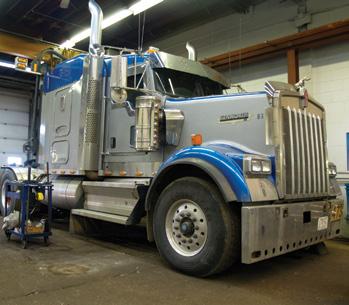



The Truckers’ Convoy
Whether you were for or against it, few topics recently have stirred as much conversation in the trucking community as the Truckers Convoy and the recent sentencing of its organizers. I have received many emails, both for and against, with understandable reasons from both sides. Here’s what some of our readers had to say:
Dear Editor,
I just want to say a few words about the Freedom Convoy. Like it or not, they stood up when a lot of us felt like nobody in Ottawa was listening.
During COVID, we hauled everything this country needed — groceries, medicine, fuel, you name it. But instead of getting a pat on the back, we got more rules, more mandates, and more headaches just trying to cross the border and do our jobs. For a lot of drivers, that was the last straw. The convoy gave us a voice. The government went way overboard — freezing bank accounts, towing rigs, and treating regular working people like criminals. People have a right to stand up and be heard. Now the organizers have been sentenced. Chris Barber got an 18-month conditional sentence of 12 months house arrest and six months curfew. Tamara Lich got the same. 12 months house arrest and 3½ months on curfew. Both of them also have to do 100 hours of community service. The government wanted jail time, but thankfully, the court disagreed.
They were both convicted of mischief, which doesn’t mean violence — it’s basically for blocking roads or not packing up when ordered to.
The convoy might not have fixed much, but it proved that when working people get fed up, they’ll make themselves heard. If we start locking folks up just for speaking out, we begin to look like a third-world country.
Professional Driver
Editor’s Comment: Many drivers share the writer’s concern about how far the government went during the Ottawa convoy. The main charge laid against the organizers was “Mischief.” It is explained as obstructing, interrupting, or interfering with the lawful use of property or public space and carries a maximum penalty of 10 years in prison. The government asked for significant jail time, but as you said, the court did not agree.
Dear Editor,
A lot of people still think the convoy that rolled into
Ottawa started as a trucking protest that somehow got out of hand. But let’s be honest — the whole thing was never really about helping truckers in the first place. It was built to look like it was.
The folks behind it knew Canadians respect truck drivers, so they used that image to draw attention to their own causes. They wrapped themselves in our reputation — hard-working, independent people who kept the country going through COVID — and sold the story that they were standing up for us. But that was never the plan. The real goal was political.
Anti-vaxxers and Western separatists saw how frustrated drivers were after years of low pay, bad parking, and long hours, and they used that frustration to pull people in. They told drivers the convoy was about “freedom,” but it wasn’t about the kind of freedom that gets you a fair wage, a safe rest area, overregulation or respect from the public. It was about pushing an agenda that had nothing to do with trucking.
Meanwhile, most drivers just kept hauling freight and when the smoke cleared, what did we get out of it? Nothing. No better pay, no better parking, no more respect. Just a damaged reputation for an industry that deserves better. Next time someone says they’re standing up for truckers, let’s take a closer look at who’s really behind the wheel. This is just how I see it, and I do not need the hassle, so just sign me “Still Frustrated”
Editor’s Comment: This letter makes a fair point, but it’s also true that many of the drivers who joined that convoy did it for the right reasons. They weren’t necessarily antivaxers or Western separatists; they were just tired of being ignored, working long hours for shrinking pay, and facing the same old problems — no parking, no rest areas, and no respect.
In some countries — France, for example — truckers stick together and make governments listen. When they park their rigs, things stop, and real change happens. I’ve said this many times before, here in Canada, truckers make up a massive chunk of the voting population. If Canadian drivers ever stood together with one clear message, politicians in every party would have to take them seriously.
John,
I think sentencing the convoy organizers was wrong. They were standing up for what they believed in and speaking for many Canadians who were tired of lockdowns. Protest
is part of being free, and no one should go to jail for that.
Lisa M., Saskatoon, SK
Editor’s note: I agree that the ability to protest and speak freely is the backbone of a Democracy. The problem is when it falls under the charge of mischief affects others like the merchants. This is the charge that the government used to shut it down. The letter below addresses that problem.
Dear Editor,
As a small business owner in downtown Ottawa, I feel compelled to speak out about the “Freedom Convoy” that turned our streets into a parking lot of diesel fumes and blaring air horns. For weeks, what was promoted as a peaceful protest against mandates became an occupation that crippled local commerce and held our community hostage.
My store—like many others—depends on pedestrian traffic. Instead of customers, we got barricades, idling trucks, and angry crowds. Employees were afraid to come to work. Delivery trucks couldn’t get through. Even loyal customers stayed away because they didn’t feel safe walking downtown. Meanwhile, the noise was relentless, echoing through the night and shaking windows long after closing time.
I respect the right to protest, but this was not civil disobedience—it was civic disorder. Whatever message the organizers hoped to send was drowned out by the chaos and intimidation their followers brought to our doorsteps. The economic losses to local businesses are real and lasting. Some shops may never recover. Ottawa deserves better than to be treated as collateral damage in a political spectacle. Protest is a democratic right—but so is the right to work, to rest, and to feel safe in one’s own community. Sincerely,
Local Merchant, Ottawa
Editor’s Comment: The frustration expressed by this Ottawa merchant is understandable. Many downtown businesses suffered during the protest, and their concerns deserve recognition. If roles were reversed and outside forces blocked highways, stopping truckers from doing their jobs and making it so they could not make a living, how would we react? How would we expect the government to respond?
At the same time, most truckers and supporters who took part did not do it to cause harm to the merchants. They did it out of frustration after years of restrictions, economic uncertainty, and a sense of not being heard by their government.
I’ve been a truck driver for over 20 years, and I want people

to know that not all of us supported the convoy or took part in it. Most truckers I know were still out there working hard to keep shelves stocked and fuel moving while all that was going on.
I respect anyone’s right to protest, but that event made a lot of good drivers look bad. We already deal with long hours, tough roads, and public misunderstanding — we don’t need more bad press. The convoy might have started with good intentions, but it ended up dividing people instead of helping.
The trucking industry is made up of thousands of honest, hardworking men and women who keep this country running every day.
Editor’s Reply: Thank you, Dave. Many drivers share your concern about how the convoy affected the public’s view of truckers. The vast majority of professional drivers continued to do their jobs, showing the reliability and dedication that this industry is built on.
The Convoy Didn’t Help Us
I’ve been driving truck for over 25 years, and to be honest, that convoy didn’t do a thing to help the average trucker. While they were blocking roads and making noise in Ottawa, the rest of us were waiting at shippers, fighting for fair pay, and trying to find safe places to park.
The vaccine mandate was never the biggest problem in trucking. The real issues are poor working conditions, low rates, high fuel prices, and a lack of respect for drivers. Those are the things that need fixing if anyone really wants to help truckers.
All that protest did was give the public the wrong idea about who we are. Most of us just want to do our jobs, get home safe, and make an honest living.
Editor’s Reply: Many drivers agree that the real challenges in trucking go far beyond government mandates. Pay, parking, and working conditions remain top concerns across the country. Still, the convoy drew attention to frustrations that have been building for years — and maybe now the focus can shift toward finding real solutions for professional drivers.
Editor’s Closing Note:
The convoy continues to divide opinion, and the conversation is far from over. I am disappointed that many did not want to put their names to their letters, but given the topic’s sensitivity, it is understandable. One was from a driver who voiced a different opinion than that of his boss, another worried about how he would be hastled by his coworkers. This is unfortunate but we welcome all respectful letters and will, in some cases, print anonymous ones if they add to the conversation.

In my time on the highways and in the pages of this magazine, I have been known to complain about the quality of the roads around the country. I may have also had a few choice words about the quality of our drivers a time or two. I knew my recent trip to South America was going to be life-changing for sure, but I did not expect it to make me grateful for the roads and drivers here!
Our Flight landed in Lima, Peru, at around 10 pm, and we hustled out to catch the airport shuttle for our quick overnight before heading to Cusco the next day. It was about 38 seconds into this ride that I recognized traffic rules were more of a suggestion in Peru and the horn was to be used often. That horn use was in full force in the morning, but the shuttle back to the airport seemed less dangerous in the light of day, so I chalked up the previous night’s drive to tiredness, and we flew away to Cusco.
Cusco City sits at an altitude of around 10,000ft, with roads in the surrounding area reaching upwards of 14,000ft. The airport is clean and relatively small, so when we went out to our hotel shuttle this time, it was quiet and I thought Lima was a one-off. I was wrong. Lane indicators pretty much don’t exist in the city. From what I witnessed on the drive to the hotel, you navigate your way through traffic by using passiveaggressive movements to slip into slight openings. Generally, you push your way through and follow it up with horn honks when the other road users fail to read your mind.
Walking the streets of the historic district, we realized that pedestrians have no rights, and even when you have
the walk sign, you have to keep your head on a swivel. Some streets are no more than 12 feet wide, including the sidewalks on each side. These are oneway streets, and my recommendation is to walk in the opposite direction as traffic so you can get skinny against the wall when a tourista Sprinter van is approaching.
Riding in the tour vans is another hair-raising experience in the country, as we discovered during a tour to the Rainbow Mountains. The driver we had was possibly a castoff from the World Rally Championship, or a former getaway driver for bank robbers, maybe an immortal with no concern for life... Whatever the case, we spent two and a half hours on the driver there, wondering if it was a head-on collision that would be our demise or simply a sprinter van drift gone wrong, sending us to the bottom of the ravine. I tried to ask the driver if he knew the mountains had been there for millions of years and explain that I thought they could wait an extra 20 minutes for us to get there safely. Either my unintelligible Spanish didn’t get through, or I insulted him because it seemed worse on the drive back to Cusco.
After we left Peru, we flew into Santiago and had a rental campervan so I could try my hand at this crazy practice. With 10 days in Peru, I thought I understood the language of the horn well enough to communicate with the other drivers. Much like Spanish, however, the dialects differ slightly by region, and I may have offended a few motorists with my toots and honks. Judging by one gesture, I may have insulted his mother. In all seriousness, once outside the Santiago area, once traffic died down a bit, driving in Chile

By Greg Evasiuk
Greg is a 3rd generation trucker with over 1 million miles and 22 years in trucking.
was not that different from North America. The roads were decent, the truck stops were pretty clean and plentiful, and the drivers were mostly respectful. We even explored some amazing gravel backroads, and aside from the language barrier, which raised some questions about what we had on our plates, Chile was awesome.
Argentina... from the border to San Juan de Bariloche was amazing. The views of the lakes and the twisty mountain roads are awesome! From there south through the desert to El Chalton was something else. Of that 1600-odd km drive, about 500km is fair to good pavement, another 400km is poor pavement, about 250 or so is gravel that is yet to be paved, and the rest looks like the surface of the moon. I’m not kidding, we were dodging potholes the size of our little van, and there were a few hundred kilometres where the road is so bad everyone drives down the ditch. I have the pictures to prove it!
Comedy aside, our trip was more than just an episode of “Don’t drive here”. We had some life-changing experiences, seeing ruins and vistas that still have me in awe. There were five-star meals in Cusco that will stay with me, truly amazing culinary skills in that city. Despite it all, there’s no place like home, and I am grateful for all we have. So I’ll try to be the same regarding our roads!


Sadly Dave Madill passed on May 1st of this year. He will always be fondly remembered and missed.
Mother freedom has been wounded, smoke rises around her like a cloud, Bodies of her children lie covered by a shroud.
I hear the corpses calling, in their anger and their pain, “We gave our lives for freedom – let us not die in vain.” Struck down by a coward’s hand, in their innocence they died, Freedom’s torch they throw to you: hold this banner high. We must always be vigilant; this is a price we must pay, Or we will lose our freedom to a tyrant’s will some day. Stand on guard my brothers, stand tall and proud my sons, Though we may pay an awful price, this battle will be won.
You might have heard... It’s flake season. If you’ve been driving for hours before the need to chain up, make sure to warm up those muscles before stepping out into the cold. Chaining up is a workout on its own, and triples offer an even better workout. It can put you at risk of pulling a muscle—or worse. It happens! Remember, it’s not a race. Take your time and do it right.
Even in summer, those chains on the rack can be used to pump your intimidating muscles. Pump them or carry them on a walk. Do weighted pull-ups with chains—be creative and dedicated, with no excuses. Just remember, your size and capacity matter when it comes to avoiding injuries.
At any given time, you’re only a few clicks away from downloading a step-counting app from your phone provider. For me, I always aim for 10,000 steps a day—separate from workouts. My workouts are “creative workouts,” meaning I don’t need a gym, and neither do you. Fitness options are always around us. It’s a mindset: if you want it, you’ll get it.
A simple example—while sitting in the driver’s seat, tighten your ass muscles. Pump it, pump it! Pump it, hold, relax, and keep pumping like that for five minutes. It burns calories, and your gay neighbour will probably compliment you. LOL.
I often hear drivers say, “I don’t need to work out; I do tarping.” And I agree—it has its moments. But you can also grab the smallest rolled-up tarp and pump it over your head a bunch of times whenever you get the chance. Do a few sets—it adds up.
Never worry about what folks think or whether someone’s watching. Focus on you and your fitness.
No matter what heavy object you have around to lift, it doesn’t matter. What matters for maximum benefit is lifting it as many times as possible before resting, then repeating. That’s called a “set.” Three to five sets are a solid practice.
I’ve heard it said that fitness has more impact on your health than diet or giving up sinful habits. Of course,

By Marcel Larouche
if you do give up all sins and go to confession, that might give you the full package of top health benefits— until you die. Which is my goal: “Healthy till I die.” I never aimed to live to be old—just healthy till I’m done. I got old by accident!
Legal Waiver:
“Before following any fitnessrelated ideas from anyone (especially me), check with your doctor, your lawyer, and—most importantly— your spouse, who might be insecure about you improving your appearance.”









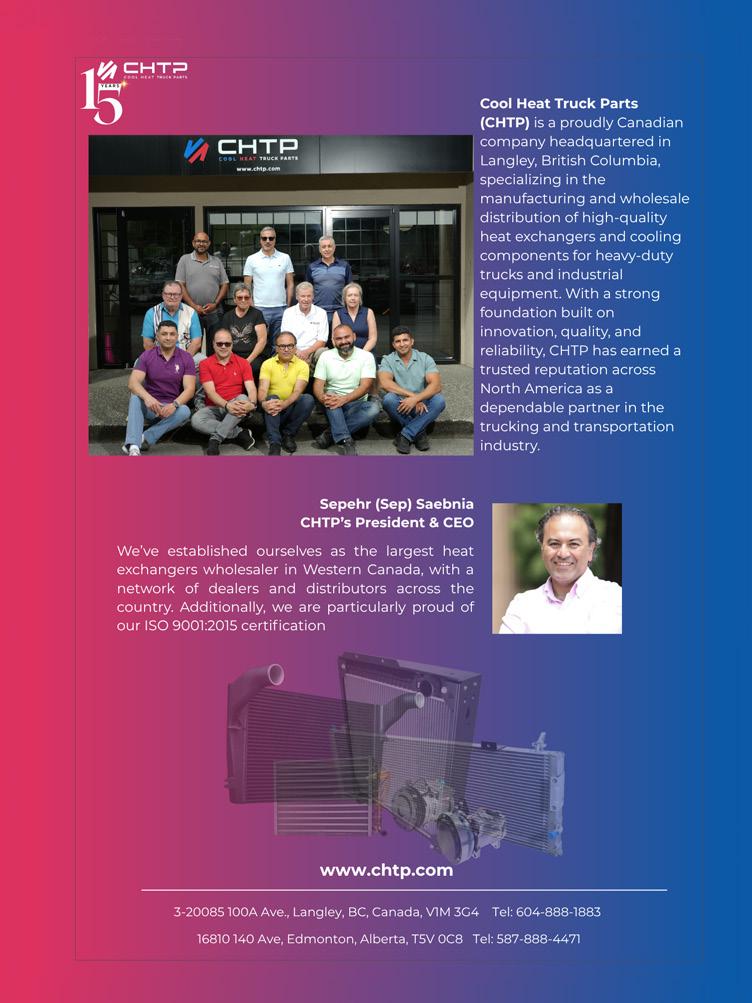

If you’ve ever hauled from one end of this country to the other, you already know that what’s legal in one province can get you a ticket in the next.
Today, every province has its own version of the MELT training program — MELT stands for Minimum Entry Level Training — but some provinces tweak the hours, others change the curriculum, and a few are still catching up. The MELT program is widely regarded as a complete failure and is recognized by many in the industry as a bandaid approach that was put in place to placate the unknowing public.
For an industry that moves freight across provincial borders every day, it makes no sense that we don’t have a single, national standard for how drivers are trained.
Here’s how it’s set up now. The federal government, through Transport Canada, looks after things like vehicle safety standards, Hours of Service, ELDs, and the rules for carriers that cross provincial or international borders.
But driver training and licensing are up to each province or territory. They decide how long your training program is, what it covers, who can teach it, and what kind of test you have to pass. That’s why a driver trained in Alberta may not have had the same classroom or road time as one trained in B.C., Ontario, or Nova Scotia.
The result? We have one national highway system, but ten different
training systems feed into it.
When training isn’t consistent, safety isn’t consistent either. Some schools give students real-world time on the road — mountain driving, chaining up, backing into tight docks, and securing loads properly. Others rush through the basics, with their only goal being to help you pass the provincial test as quickly as possible, earning them the reputation of being the place to go to get a quick and often cheap and at times a phony license.
The truth is, the quality of your first training can make or break your career. It affects safety, insurance, and even how the public sees all of us who make a living behind the wheel.
A Red Seal Program is a national standard for tradespeople that lets a qualified worker move from province to province without having to retrain. Let’s make one thing clear — driving a truck has as many variables, skills, and responsibilities as any recognized trade. So why shouldn’t it be treated like one?
A Red Seal for professional drivers would mean one consistent national training program, common testing standards, recognition of skill and experience across Canada, and higher credibility with insurance companies and employers.
When you raise the standard, you raise the pay. A recognized, professional credential gives drivers the bargaining power they deserve. It tells employers, “This person has

By John White
proven skills.” That kind of respect translates into better wages, steadier work, and improved conditions — something this industry has needed for a long time.
It would also help stop the undercutting we see from fly-bynight operations that pay bottomdollar wages and cut corners to grab freight contracts. Those outfits drive down rates for everyone — including the good companies that play by the rules. A Red Seal standard would make it harder for unqualified carriers to flood the market with poorly trained, underpaid drivers.
And let’s be honest — most reputable companies would welcome it. Any fleet owner or safety manager will tell you how hard it is to find reliable, qualified drivers these days. Having a national certification system would take a lot of guesswork out of hiring. If a driver walks in with a Red Seal, that company knows they’ve been properly trained and tested to a proven Canadian standard. It saves time, reduces risk, and helps fleets operate more safely and efficiently.
A Red Seal for trucking would do more than improve safety — it would open doors. Right now, young people entering the workforce are told to look at the trades if they want
security, benefits, and mobility. But trucking isn’t on that list — and that’s a missed opportunity.
If professional driving were a recognized Red Seal trade, it would suddenly become a real career choice for young Canadians looking for stability and pride in their work. They could train, apprentice, and certify just like a welder, mechanic, or electrician — building a future that includes solid pay, good benefits, and long-term opportunity.
It would also help reduce unemployment by giving more Canadians a clear path into the driver’s seat. Instead of continually importing drivers from around the world to fill vacancies, we could train our own — keeping those paycheques, taxes, and skills right here at home.
We’ll always welcome new Canadians who want to be part of this industry, but there’s no reason young Canadians shouldn’t see trucking as a trade worth choosing.
Being Red Seal certified would mean more than just bragging rights. It would come with real-world advantages: better pay and benefits, mobility between provinces without retraining, career advancement into training and safety management, and recognition that trucking is a skilled trade on par with any other. Carriers employing certified drivers would likely qualify for lower insurance rates and stronger safety ratings — savings that could be shared with drivers instead of spent fighting bureaucracy.
No one’s saying veteran drivers should be forced back to school. A Red Seal program could easily “grandfather” in current drivers. Those with a few years of clean, verifiable experience could earn the credential based on their record. Others could challenge the test —
no need for a full course if you’ve already been doing the job safely for years. That way, we don’t punish experience — we honour it.
A Red Seal for truck drivers wouldn’t just make the job safer — it would make it more respected. It would give new drivers a clear path, experienced drivers proper recognition, and the public greater confidence in the people hauling their groceries, lumber, and fuel.
Right now, trucking is one of the

few national industries still regulated by the provinces. That might’ve made sense decades ago, but not anymore. Freight moves nationally — and our training should too.
It’s time to get all ten provinces and three territories pulling in the same direction. Because at the end of the day, safety, professionalism, and pride don’t stop at the border — and neither do we.


TOTAL FUEL PROTECTION
Trusted by truckers for decades, Howes Diesel Treat is more than an anti-gel, it’s complete fuel protection for extreme cold. It prevents gelling, protects pumps and injectors, and adds lubricity to ght ULSD wear. Treat before temperatures drop to 32°F and below for smoother starts, cleaner combustion, and dependable performance all winter long. You go, or we pay the tow.




Surrey, BC – The 3rd Annual Metro Vancouver Transportation Night (MVTN) took place on October 2nd, 2025, at the Aria Banquet and Convention Centre, impressing guests from near and far. More than 265 attendees, all from the trucking industry, were welcomed with some great keyboard music. Guests then took the opportunity to enjoy appetizers, have some cocktails and mingle with other industry professionals before the event began.
In the few past years, the transportation industry struggled to regain its momentum, as shown by low sales and load volumes. And the Trump factor hasn’t helped our industry


as well. Industry growth could be described as conservative, making the theme for 2025 – “Energizing Trucking” – an appropriate one. The guest speakers, from across North America, shared insights and views on how to energize our trucking industry. In addition, many shared specific ways to not only grow your business, but also find resources to assist companies, whether local, national, or North American.
MVTN 2025 guest speakers came from a broad spectrum, specializing in diverse roles expertise. The revered list included Dave Earle, President, BC Trucking Association; Charlie Cubeta, Senior Manager, Samsara; Jason Scultety, Senior Key Account Manager, BC
Hydro; Tina Capobianca, Senior VP, JD Factors, Nelson Gonzalez, Senior Manager, ICBC, and Amit Bhardwaj, Partner, Golden Express Trucking. Steven Haywood, Executive Director at CVSE could not make the event, but he will be doing a virtual seminar soon.




Jasmine Kang, VP Operations at Cummins Canada, gave the keynote address. Her words of hard work, integrity, and having a positive outlook, taken from her own experiences, resonated with attendees.
All guest speakers captured the audience’s attention, as many wanted to learn of new ways to improve their fleets and/or businesses. Following the presentations, many company owners connected with guest speakers to gain more insights.
MVTN 2025 continued to grow its scholarships and awards. This year, four scholarships were awarded; Grade 12 students, Lincoln Grewal and Sehaj Kaur Benipal, each received scholarships in the amount of $1500 towards postsecondary education. University students Tarandeep Sidhu and Haiman Johal also received scholarships in the amount of $1500 to continue their postsecondary studies. Sukhminder Chohan of Northwest Freightways was the


recipient of the prestigious Driver of the Year Award, sponsored and presented by Volvo Trucks Canada. Parveen Sran of Triple Eight Transport Inc. received the prestigious Employee of the Year Award, sponsored and presented by JGK Media Group. And finally, Sandra Stashuk from the BCTA received the inaugural Woman of Influence Award.
“We will continue to support the coming generations with their educational goals,” said Sepehr Saebnia, President of Cool Heat Truck Parts.
“To see the scholarship category double in just one year is an amazing feeling. And we hope to grow it for next year too,” added Bobby Saini of JGK Media Group.
“Volvo Trucks Canada is proud to support and recognize the Driver of the Year Award,” said Blair Mcgeough, Volvo Trucks District Sales Manager. “To recognize a driver like Sukhminder is an honour because he practices the values of safety and integrity that are the backbone of Volvo Trucks.”

“Parveen Sran is a Planning Supervisor, and she’s demonstrated excellent work ethic, integrity, and the ability to step up when needed. Thus, she’s a fitting recipient of the Employee of the Year Award,” said Ron Dhaliwal of the APNA Truck Show.

Following the event, organizers received an overwhelming amount of positive feedback. Some comments include:
Dariusz Malinowski: Thank you for hosting another great event. We had a great time and look forward to next year.
Victor Grigoletto: MVTN is a great event for our team to connect with the fleets in the area. We are happy to support this event.
Jas Purewal: Thank you thank you for such a wonderful evening last night. We were so happy to be a part of it and look forward to many more.
JGK Media Group is honoured to work with such a diverse group of supporters, partners, guest speakers and attendees. This year again, thank you to the Canadian Trucking Association and the Port Transportation Association for helping organize MVTN 2025.
About JGK Media Group
JGK Media Inc. is a leading media company based in British Columbia that has helped companies meet their marketing and communication goals since 2008. Serving across North America, JGK Media Group prides itself in bringing various industries together through print, digital, and faceto-face platforms.
For more information, visit www. jgkmedia.ca or contact Jag Dhatt at jag@jgkmedia.ca.
By SafetyDriven – Trucking Safety Council of BC
Winter in British Columbia is no joke. With its winding mountain highways, unpredictable weather, and rapidly changing conditions, it is no wonder even experienced drivers say it is the most challenging time of year to be behind the wheel. For professional truck drivers, those challenges can multiply- longer stopping distances, icy roads, low visibility, and time-sensitive deliveries all combine to create the perfect storm of risk.
That is why trip planning and checking road conditions are not just good habits, they are lifesaving ones. Taking the time to plan your route, anticipate conditions, and prepare for emergencies helps ensure you get where you are going safely and efficiently, no matter what the weather throws at you.
Every safe trip sta rts long before the engine turns on. Trip planning allows drivers to assess their route, check for potential hazards, and prepare for delays or detours. It is not just about knowing where you are going, it is about knowing what to expect along the way.
safely and manage rest breaks.
Know the Conditions Before You’re in Them
British Columbia’s terrain can take you from sea level to snowy mountain passes in just a few hours. One moment, you are driving through rain; the next, you are facing black ice and blowing snow. The only way to be ready is to stay informed.
Check multiple sources for road condition updates:
• DriveBC.ca provides live highway cameras, road condition reports, and information on maintenance activities.
• WeatherCAN or Environment Canada offers detailed weather warnings and forecasts.
• BC Highway Maintenance contractors often post updates on social media, especially about plowing and sanding schedules.
If conditions worsen, do not hesitate to pull over. Knowing when not to drive is as important as knowing when to go. Even the most skilled drivers can not outsmart physics- if traction is gone, control is gone.

By: Safety Driven: Trucking Safety Council of BC
The Human Factor: Fatigue and Focus
Even the best-planned trip can go wrong if the driver is not alert. Fatigue, stress, and distractions are amplified in winter driving conditions. Trip planning helps reduce that mental load by minimizing surprises and allowing you to focus on the road.
Take regular breaks, stay hydrated, and fuel your body with nutritious food rather than relying on caffeine alone. If weather or road conditions are worsening, do not push through- communicate with dispatch, find a safe place to stop, and wait it out. Safety should always outweigh schedules.

Equipment and Emergency Prep
Planning also means ensuring your equipment is ready for whatever comes your way. A pre-trip inspection should include extra attention to winter-specific needs:
Winter safety is not just the responsibility of the driver- it is shared across fleets, dispatchers, and maintenance teams. Employers should ensure drivers have access to reliable weather and road condition tools, receive winter driving training, and feel empowered to make safe decisions, even if it means delaying a delivery.
At SafetyDriven – Trucking Safety Council of BC, we believe that a wellplanned trip is the foundation of every safe journey. Whether you are crossing mountain passes or hauling locally, preparation and awareness can prevent incidents and save lives.
Before you leave, take a few minutes to:
• Check weather forecasts along your entire route, not just your departure and destination points. Conditions can change drastically between the Lower Mainland and the Coquihalla Summit.
• Review DriveBC and weather apps for up-to-date information on road closures, accidents, construction, and avalanche control activities.
• Plan your stops for fuel, food, and rest, and make sure there are safe pullouts or truck stops along the way.
• Communicate your route to dispatch or family members in case of an emergency.
Good trip planning also means having realistic expectations. In winter, slower speeds and longer travel times are the norm. Pushing to stay on schedule can increase risk, so factor in extra time to drive
• Tire condition and chains: Make sure your tires meet minimum tread depth requirements and that your tire chains are in good condition, properly fitted, and ready for use.
• Lights and wipers: Clear visibility is crucial, so make sure your lights are working when you complete your pre-trip inspections! Replace wiper blades as needed and keep washer fluid topped up.
• Fluids and brakes: Cold temperatures can affect performance, so confirm your antifreeze, oil, and brake systems are winter-ready.
• Emergency supplies: Always carry a winter emergency kit: warm clothing, blankets, food, water, flashlight, batteries, and traction aids.
If you are stranded due to a road closure or storm, these supplies can make the difference between discomfort and danger.
As winter settles in, remember: the few minutes you spend planning your trip could save hours of delay or even your life. Before you roll, check the road.
And this season, keep an eye out for the SafetyDriven team at our Safety Popup Barbecues at cardlocks across BC! Be sure to stop and say hi, grab a free hot meal, and pick up your copy of the Driver Handbook, packed with great tips and practical information to help you stay safe on the road all year long.
For more information for where our next pop-up will be, visit SafetyDriven.ca.
Stay safe, stay informed, and keep those wheels turning- safely.

If, like me, you’ve been a driver for forty or so years, you will have worked for good and bad companies. One company I was working for decided to close my depot, so all the drivers were being made redundant. There were plenty of jobs available at the time, so there were no worries about bills not being paid. My depot manager at the time mentioned that his friend was seeking drivers for a large German grocery store company called Lidl.
Four of us went out to see what the job entailed. It seemed easy enough, so another driver and I decided to give it a try. After a week of going out with one of the experienced drivers to show us the ropes, we were on our own.
Then the small changes started. The attitude of the company was, we’re changing this. If you don’t like it, now is the time to leave. You were paid a set wage for five days, so no overtime was paid, and any extra hours you worked went into banked time. If work was quiet and you had enough hours in your bank, you were told to take the next day off when you clocked off. That happened to me once, but at the end of my day off, the company rang me to say the work was still quiet and to take the following day off also, which annoyed me. Not being
able to choose when you take your days off, especially having two days together that could have been used as a good break.

Warehouse staff were reduced, and more work was put onto the drivers. Previously, warehouse staff loaded the trailers; now, drivers are responsible for loading their own. No big deal there; loading and unloading trailers was always part of the job for me. But when you have to go into the freezer section to get part of your load, and it’s minus 25 degrees in there, you look a bit out of place beside the freezer guy dressed in his big, insulated work gear.
Another thing that annoyed me was when I got two stores to deliver to. If I’m held up at the first store, I might not make it to the next delivery on time, especially if I have to unload my trailer and load my second one at the depot. As the stores all closed at eight o’clock, I was given a key to the back door and the alarm code for the store I was going to, but locking the door behind me didn’t make me feel secure while unloading. There was still a gap all around the trailer, and at the back of those stores, anybody could’ve got in that gap,
By Colin Black
Colin Black lives in Bellshill, Lanarkshire, Scotland and has been driving truck for over 40 years. His story shows us once again that the problems drivers face are universal.
or I could’ve slipped on the loading ramp and lay pinned under a pallet until morning.
There were a few drivers who were long-term employees and got the same truck every day. These guys had added extra lights and air horns; you know what it’s like when you drive the same truck every day. The rest of us just took the first truck in the parking lot. So, when I saw one of those drivers stripping his extra lights and air horns off his truck because he was leaving, I thought, he’s been here for years, and now he’s going because of all the changes.
So, I did something I’d never done before - I left a job without having another one lined up. I’d lasted ten weeks. I clocked off one night and was told the work was quiet take the next day off. I went home and decided enough was enough; I phoned the company the next day and told them I wouldn’t be back.
Politicians and diapers have one thing in common: they should both be changed regularly… and for the same reason.














